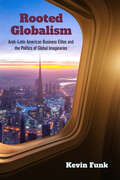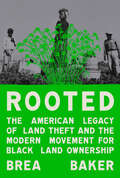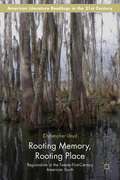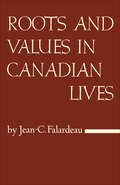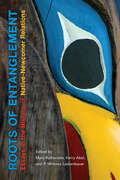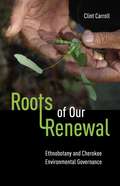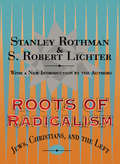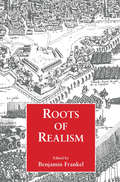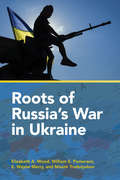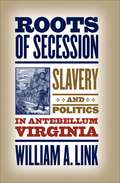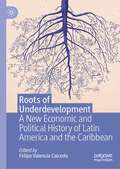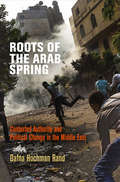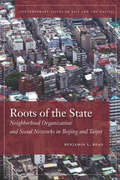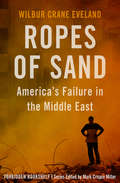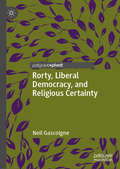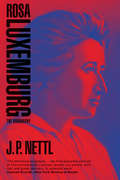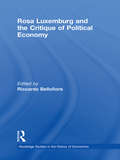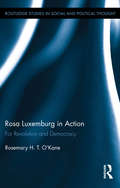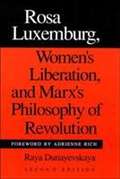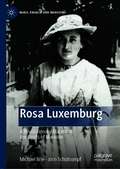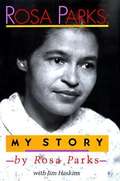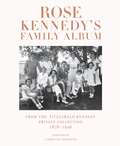- Table View
- List View
Rooted Globalism: Arab–Latin American Business Elites and the Politics of Global Imaginaries (Framing the Global)
by Kevin FunkDoes the concept of nationality apply to the economic elite, or have they shed national identities to form a global capitalist class?In Rooted Globalism, Kevin Funk unpacks dozens of ethnographic interviews he conducted with Latin America's urban-based, Arab-descendant elite class, some of whom also occupy positions of political power in countries such as Argentina, Brazil, and Chile. Based on extensive fieldwork, Funk illuminates how these elites navigate their Arab ancestry, Latin American host cultures, and roles as protagonists of globalization. With the term "rooted globalism," Funk captures the emergence of classed intersectional identities that are simultaneously local, national, transnational, and global. Focusing on an oft-ignored axis of South-South relations (between Latin America and the Arab world), Rooted Globalism provides detailed analysis of the identities, worldviews, and motivations of this group and ultimately reveals that rather than obliterating national identities, global capitalism relies on them.
Rooted: The American Legacy of Land Theft and the Modern Movement for Black Land Ownership
by Brea BakerWhy is less than 1% of rural land in the U.S. owned by Black people? An acclaimed writer and activist explores the impact of land theft and violent displacement on racial wealth gaps, arguing that justice stems from the literal roots of the earth. &“With heartfelt prose and unyielding honesty, Baker explores the depths of her roots and invites readers to reflect on our own.&”—Donovan X. Ramsey, author of the National Book Award for Nonfiction semi-finalist When Crack Was KingTo understand the contemporary racial wealth gap, we must first unpack the historic attacks on Indigenous and Black land ownership. From the moment that colonizers set foot on Virginian soil, a centuries-long war was waged, resulting in an existential dilemma: Who owns what on stolen land? Who owns what with stolen labor? To answer these questions, we must confront one of this nation&’s first sins: stealing, hoarding, and commodifying the land.Research suggests that between 1910 and 1997, Black Americans lost about 90% of their farmland. Land theft widened the racial wealth gap, privatized natural resources, and created a permanent barrier to access that should be a birthright for Black and Indigenous communities. Rooted traces the experiences of Brea Baker&’s family history of devastating land loss in Kentucky and North Carolina, identifying such violence as the root of persistent inequality in this country. Ultimately, her grandparents&’ commitment to Black land ownership resulted in the Bakers Acres—a haven for the family where they are sustained by the land, surrounded by love, and wholly free.A testament to the Black farmers who dreamed of feeding, housing, and tending to their communities, Rooted bears witness to their commitment to freedom and reciprocal care for the land. By returning equity to a dispossessed people, we can heal both the land and our nation&’s soul.
Rooting Memory, Rooting Place
by Christopher LloydThis timely and incisive study reads contemporary literature and visual culture from the American South through the lens of cultural memory. Rooting texts in their regional locations, the book interrupts and questions the dominant trends in Southern Studies, providing a fresh and nuanced view of twenty-first-century texts.
Roots and Values in Canadian Lives
by Jean-Charles FalardeauThis thought-provoking volume, which represents a re-shaping of the Plaunt Lectures delivered at Carleton University, 1960, offers impressions of the art of living in Canada by one who has been deeply concerned with the relationships between our two cultures. The purpose of the author is to stimulate reflection on the genesis and the contemporary status of Canada as a bi-cultural nation. His own method in the book is also that of reflection, rather than didactic exposition. He takes up the manifestations of our two cultures in our two literatures, describes his own experience of living personally and professionally with members of both groups, and goes on to analyse what contribution Canadian universities might make to greater understanding of our biculturalism. It is in the university setting that the author sees hope of a new humanism, thanks particularly to the vision of the world offered by the social sciences; it, he feels, will enable us to see both aspects of our country fully and harmoniously and grasp its responsibility as a unified nation to the rest of the world. Canada, says the author, is not a datum but a construct; it is a becoming. It has been and remains the result of constant compromise. Patterns and objectives have to be constantly redefined and improvised, with both parties in our dualism collaborating to create a well-tempered, yet positive national life.
Roots of Entanglement: Essays in the History of Native-Newcomer Relations
by Myra Rutherdale P. Lackenbauer Kerry AbelRoots of Entanglement offers an historical exploration of the relationships between Indigenous peoples and European newcomers in the territory that would become Canada. Various engagements between Indigenous peoples and the state are emphasized and questions are raised about the ways in which the past has been perceived and how those perceptions have shaped identity and, in turn, interaction both past and present. Specific topics such as land, resources, treaties, laws, policies, and cultural politics are explored through a range of perspectives that reflect state-of-the-art research in the field of Indigenous history. Editors Myra Rutherdale, Whitney Lackenbauer, and Kerry Abel have assembled an array of top scholars including luminaries such as Keith Carlson, Bill Waiser, Skip Ray, and Ken Coates. Roots of Entanglement is a direct response to the Truth and Reconciliation Commission’s call for a better appreciation of the complexities of history in the relationship between Indigenous and non-Indigenous peoples in Canada.
Roots of Our Renewal: Ethnobotany and Cherokee Environmental Governance (First Peoples: New Directions in Indigenous Studies)
by Clint CarrollHonorable Mention: Labriola Center American Indian National Book Award In Roots of Our Renewal, Clint Carroll tells how Cherokee people have developed material, spiritual, and political ties with the lands they have inhabited since removal from their homelands in the southeastern United States. Although the forced relocation of the late 1830s had devastating consequences for Cherokee society, Carroll shows that the reconstituted Cherokee Nation west of the Mississippi eventually cultivated a special connection to the new land—a connection that is reflected in its management of natural resources.Until now, scant attention has been paid to the interplay between tribal natural resource management programs and governance models. Carroll is particularly interested in indigenous environmental governance along the continuum of resource-based and relationship-based practices and relates how the Cherokee Nation, while protecting tribal lands, is also incorporating associations with the nonhuman world. Carroll describes how the work of an elders&’ advisory group has been instrumental to this goal since its formation in 2008.An enrolled citizen of the Cherokee Nation, Carroll draws from his ethnographic observations of Cherokee government–community partnerships during the past ten years. He argues that indigenous appropriations of modern state forms can articulate alternative ways of interacting with and &“governing&” the environment.
Roots of Radicalism: Jews, Christians, And The New Left
by Stanley RothmanWhen Roots of Radicalism first appeared. Nathan Glazer noted "this is a major work on the relationship between radical politics and psychological development." He went on to predict "no one will be able to write about the left and radicalism without taking it into account." Now finally available in a paperback edition, with a new introduction, the reader can evaluate just how prescient the authors are in their review of the student radical movement. Replete with interviews of radical activists, their provocative book paints a disturbing picture.The book raises critical questions about much previous social science research and ultimately about the reason an entire generation of Americans was so infatuated with the radical mystique. Robert A. Nisbet called the book "an extraordinarily skilled fusion of historical and psychological approaches to one of the most explosive decades in American social history." Robert E. Lane added "it will be prudent to read Rothman and Lichter along with our well worn copies of Keniston and Fromm." Writing in Political Psychology, Dan E. Thomas argued "the [book] is arguably the most important and definitely the most provocative book in the field of personality and politics to have appeared in the past several years." Recently, in Forbes. Peter Brimelow referred to Roots of Radicalism as "Rothman's main achievement as a political scientist...his definitive study of the 1960s New Left."In the new introduction, the authors review the initial reception of Roots of Radicalism and its subsequent treatment. They also review the major literature on the causes, course, and consequences of the student movement of the 1960s which has appeared since the publication of the book. Finally, they update their own analysis.
Roots of Realism (Cass Series On Security Studies)
by Benjamin FrankelPolitical realism sees politics as a permanent struggle for power and security. The essays in this volume examine the tradition of realist political analysis of international relations from the Sophists and Thucydides to the modern era.
Roots of Russia's War in Ukraine
by Elizabeth Wood Maxim Trudolyubov E. Wayne Merry William PomeranzIn February 2014, Russia initiated a war in Ukraine, its reasons for aggression unclear. Each of this volume's authors offers a distinct interpretation of Russia's motivations, untangling the social, historical, and political factors that created this war and continually reignite its tensions.What prompted President Vladimir Putin to send troops into Crimea? Why did the conflict spread to eastern Ukraine with Russian support? What does the war say about Russia's political, economic, and social priorities, and how does the crisis expose differences between the EU and Russia regarding international jurisdiction? Did Putin's obsession with his macho image start this war, and is it preventing its resolution? The exploration of these and other questions gives historians, political watchers, and theorists a solid grasp of the events that have destabilized the region.
Roots of Secession
by William A. LinkOffering a provocative new look at the politics of secession in antebellum Virginia, William Link places African Americans at the center of events and argues that their acts of defiance and rebellion had powerful political repercussions throughout the turbulent period leading up to the Civil War.An upper South state with nearly half a million slaves--more than any other state in the nation--and some 50,000 free blacks, Virginia witnessed a uniquely volatile convergence of slave resistance and electoral politics in the 1850s. While masters struggled with slaves, disunionists sought to join a regionwide effort to secede and moderates sought to protect slavery but remain in the Union. Arguing for a definition of political action that extends beyond the electoral sphere, Link shows that the coming of the Civil War was directly connected to Virginia's system of slavery, as the tension between defiant slaves and anxious slaveholders energized Virginia politics and spurred on the impending sectional crisis. An upper South state with nearly half a million slaves--more than any other state in the nation--and some 50,000 free blacks, Virginia witnessed a uniquely volatile convergence of slave resistance and electoral politics in the 1850s. While masters struggled with slaves, disunionists sought to join a regionwide effort to secede and moderates sought to protect slavery but remain in the Union. Arguing for a definition of political action that extends beyond the electoral sphere, William Link shows that the coming of the Civil War was directly connected to Virginia's system of slavery, as the tension between defiant slaves and anxious slaveholders energized Virginia politics and spurred on the impending sectional crisis.-->
Roots of Underdevelopment: A New Economic and Political History of Latin America and the Caribbean
by Felipe Valencia CaicedoThis book brings together world-renowned experts and rising scholars to provide a collection of chapters examining the long-term impact of historical events on modern-day economic and political developments in Latin America. It, uses a novel approach, stressing empirical contributions and state-of-the-art empirical methods for causal identification. Contributing authors apply these cutting-edge tools to their topics of expertise, giving readers a compendium of frontier research in the region. Important questions of colonialism, migration, elites, land tenure, corruption, and conflict are examined and discussed in an approachable style. The book features a conclusion from Alberto Diaz-Cayeros, Director of the Center for Latin American Studies at Stanford University. This book is critical reader for scholars and students of economic history, political science, political economy, development studies, and Latin American, and Caribbean studies.
Roots of the Arab Spring
by Dafna Hochman RandIn December 2010, the self-immolation of a Tunisian vegetable vendor set off a wave of protests that have been termed the "Arab Spring." These protests upended the governments of Tunisia, Egypt, Libya, and Yemen while unsettling numerous other regimes throughout the Middle East and North Africa. Dafna Hochman Rand was a senior policy planner in the U.S. State Department as the uprisings unfolded. In Roots of the Arab Spring, she gives one of the first accounts of the systemic underlying forces that gave birth to the Arab Spring.Drawing on three years of field research conducted before the protests, Rand shows how experts overlooked signs that political change was stirring in the region and overestimated the regimes' strategic capabilities to manage these changes. She argues that the Arab Spring was fifteen years in the making, gradually inflamed by growing popular demand--and expectation--for free expression, by top-down restrictions on citizens' political rights, and by the failure of the region's autocrats to follow through on liberalizing reforms they had promised more than a decade earlier.An incisive account of events whose ramifications are still unfolding, Roots of the Arab Spring captures the tectonic shifts in the region that led to the first major political upheaval of the twenty-first century.
Roots of the State: Neighborhood Organization and Social Networks in Beijing and Taipei
by Benjamin L. ReadMost social science studies of local organizations tend to focus on "civil society" associations, voluntary associations independent from state control, whereas government-sponsored organizations tend to be theorized in totalitarian terms as "mass organizations" or manifestations of state corporatism. Roots of the Stateexamines neighborhood associations in Beijing and Taipei that occupy a unique space that exists between these concepts. Benjamin L. Read views the work of the neighborhood associations he studies as a form of "administrative grassroots engagement. " States sponsor networks of organizations at the most local of levels, and the networks facilitate governance and policing by building personal relationships with members of society. Association leaders serve as the state's designated liaisons within the neighborhood and perform administrative duties covering a wide range of government programs, from welfare to political surveillance. These partly state-controlled entities also provide a range of services to their constituents. Neighborhood associations, as institutions initially created to control societies, may underpin a repressive regime such as China's, but they also can evolve to empower societies, as in Taiwan. This book engages broad and much-discussed questions about governance and political participation in both authoritarian and democratic regimes.
Ropes of Sand: America's Failure in the Middle East (Forbidden Bookshelf #26)
by Mark Crispin Miller Wilbur Crane EvelandA “stinging indictment” of US foreign policy and covert operations in the Middle East from a former military attaché and CIA operative (The Christian Science Monitor). After the close of World War II, former army intelligence agent Wilbur Crane Eveland trained as a military attaché, specializing in the new focal point of global concern: the Middle East. In the decades that followed, he personally witnessed the evolution and many blunders of American Middle East policy from embassies of Arab states, inside the Pentagon and the White House, and as a principal CIA representative in the region. Finally, as a petroleum-engineering consultant, he lived with the results of America’s errors. In Ropes of Sand, Eveland delivers a richly detailed assessment of the mistakes, miscalculations, and outright failures he observed. The governments the United States armed to defend the Middle East against Russia ended in collapse. American support of the Shah of Iran led to disastrous results. Many of the major crises the US faced, from the energy shortage to the border issues of Israel, had been forecast decades earlier. Eveland explains the country’s failure to understand these problems and shows why every proposed solution, from the United Nations Partition Resolution for Palestine to the Camp David Accords, only added fuel to the fire. His insider critique is essential for understanding the Arab Spring, the threat of ISIS, and the ongoing conflicts we face in the region today. First released in 1980, this memoir was initially blocked from publication by the CIA for its revealing and critical discussion of numerous covert operations, some of which Eveland engaged in himself.
Rorty, Liberal Democracy, and Religious Certainty
by Neil GascoigneThis book asks whether there any limits to the sorts of religious considerations that can be raised in public debates, and if there are, by whom they are to be identified. Its starting point is the work of Richard Rorty, whose pragmatic pluralism leads him to argue for a politically motivated anticlericalism rather than an epistemologically driven atheism. Rather than defend Rorty’s position directly, Gascoigne argues for an epistemological stance he calls ‘Pragmatist Fideism’. The starting point for this exercise in what Rorty calls ‘Cultural Politics’ is an acknowledgement that one must appeal to both secularists and those with religious commitments. In recent years ‘reformed’ epistemologists have aimed to establish a parity of epistemic esteem between religious and perceptual beliefs by exploiting an analogy in respect of their mutual vulnerability to sceptical challenges. Through an examination of this analogy, and in light of Wittgenstein’s On Certainty, this book argues that understood correctly the ‘parity’ argument in fact lends epistemological support to the argument that religious considerations should not be raised in public debate. The political price paid—paying the price of politics—is worth it: the religious thinker is provided with a good reason for maintaining that their practices and beliefs are not undermined by other forms of religious life.
Rosa Luxemburg
by J.P. NettlA classic book on the legacy of Rosa Luxemburg's work with essays of political analysis by leading scholarsAs an advocate of social democracy and individual responsibility, Rosa Luxemburg (1871-1919) remains the most eminent representative of the revolutionary socialist tradition. She was a radical activist who was willing to go to prison for her beliefs, including her protest of the First World War. This volume provides a representative sampling of Luxemburg's essential writings, many of which have been rarely anthologized. Her examination of capitalist "globalization" in her era, the destructive dynamics of nationalism, and other topics are joined with hard-hitting political analyses, discussions of labor movement strategy, intimate prison letters, and passionate revolutionary appeals. Among the selections are "Rebuilding the International," "What Are the Leaders Doing?" and excerpts from "The Accumulation of Capital--An Anti-Critique."Luxemburg's powerful impact on the twentieth century is documented in the accompanying essays, which draw readers into the "discussions" that leading intellectuals and activists have had with this vibrant thinker. Included are essays by Luise Kautsky, Lelio Basso, Raya Dunayevskaya, Paul Le Blanc, Andrew Nye, and Claire Cohen. These writers engage Luxemburg's life and work in ways that enrich our understanding of her ideas and advance our thinking on issues that concerned her. This volume will benefit readers with its rich and continuing collective evaluation of this passionate revolutionary's life and thought.
Rosa Luxemburg
by Jason SchulmanCollection with new contributions to the debate from New Politics concerning the legacy of Rosa Luxemburg. Publishing Stephen Eric Bronner's essay 'Red Dreams and the New Millennium' along with the numerous responses to the piece, a new introduction, and an interview with Bronner stimulates the discussion around Luxemburg's legacy.
Rosa Luxemburg and the Critique of Political Economy (Routledge Studies in the History of Economics)
by Riccardo BellofioreThis book analyzes the important contributions of Rosa Luxemburg to economic theory as well as devoting some space to her background as a left social-democratic politician and her personality. The book's main focus of attention is the theory of capitalist development and the theory of the crash, but its connection with the theory of value, the theory of the monetary circuit, the theory of distribution and the theory of international finance are also explored. The contributors to the volume come from different theoretical perspectives, both from within and outside the Marxian tradition - Post-Keynesians, Kaleckians and Circuitists are all included.
Rosa Luxemburg in Action: For Revolution and Democracy (Routledge Studies in Social and Political Thought #97)
by Rosemary H. O'KaneNeither a work concerned only with her Marxist writings nor a personal biography concerned with her private life, this book examines Rosa Luxemburg’s ideas on revolution and democracy and how the two are bound together by her views on the importance of political action. Stretching, historically, from 1863 to the present, this book covers in great detail the history and developments within the German SPD during her time, the 1905 and 1917 Russian Revolutions, the German Revolution, the outbreak of World War I and the imperialism that fuelled it. It then moves on to consider political and historical developments after her death and examines her arguments on revolution and democracy in the light of the post-revolutionary government in Nicaragua: the one violent revolution that sought to establish social democracy (but failed). Also covered are aspects of Rosa Luxemburg’s life, her important writings and actions, the relevant Marxist debates in which she was involved, including, for example Bernstein’s arguments on social democracy through reform and, with Lenin, on revolutionary organization. A welcomed and timely collection presenting an important examination of the political and social context in which Luxemburg developed her activities and views and a complete understanding of the history of social democracy, the revolutionary times of a century ago and the relevance of their events and ideas for more recent revolutions for democracy in the twenty-first century.
Rosa Luxemburg, Women's Liberation, and Marx's Philosophy of Revolution
by Raya DunayevskayaDunayevskaya was articulating a Marxist humanism that searched for a doctrine of liberation in the Marxist tradition. She found that only Marx himself offered one, and that he had been, in Rich's phrase, diminished, distorted, and betrayed by post-Marx Marxists and the emerging 'Communist' states.
Rosa Luxemburg: A Revolutionary Marxist at the Limits of Marxism (Marx, Engels, and Marxisms)
by Michael Brie Jörn SchütrumpfThis book analyses the development of Rosa Luxemburg (1871–1919) as an outstanding Marxist thinker and socialist politician in the era of imperialism and revolution. Identifying the driving force behind Luxemburg’s development as the deep unity between her passionate, emphatic life and her political and theoretical work, the authors retrace the inner dynamics of its different stages while highlighting the deep rupture caused by the experience of the Russian Revolution. On the basis of new publications of her Polish works and other writings, Luxemburg's strategic approaches are located in an Eastern European context. The authors discuss Luxemburg’s unique analyses of the first experiments in socialist participation in government, of the first Russian revolution and of the forms of accumulation of capital to outline the foundations of her novel understanding of both democratic-socialist revolution and of a society that would point beyond social democracy as well as Bolshevism – a vision that will gain new significance in the twenty first century. This book looks upon the lasting heritage of Rosa Luxemburg as the groundbreaking thinker of the unity between democracy and socialism.
Rosa Parks: My Story
by Jim Haskins Rosa Parks"The only tired I was, was tired of giving in." These are the simple yet eloquent words of Rosa Parks, who on December 1, 1955, refused to give up her seat to a white man on a segregated bus, sparking the Montgomery, Alabama, bus boycott. A year later when the boycott was over, there was a federal injunction against segregation on buses; Dr. Martin Luther King, Jr.m was a national figure; the civil rights movement was a national cause; and Rosa Parks was out of a job. Yet there is much more to Rosa Parks's story than just one act of defiance. Now that story is told for the first time. Raised by a strong mother and grandparents, Rosa was always proud of her heritage and believed that all people, regardless of race, were equal. With courage and determination she became one of the only two women activists with the Montgomery NAACP long before the boycott, and she was a tireless speaker for the civil rights movement long afterward. Her husband, Raymond Parks, an early activist himself, encouraged her to participate in the struggle for equality, complete her education, and register to vote. Written in her own straightforward and moving language, this compelling account speaks dramatically to our times and reveals the deliberate choices that clearly earned Rosa Parks the title "Mother to a Movement." Long before there was a civil rights movement, long before there was a women's movement, there was Rosa Parks. Her dedication is inspiring; her story is unforgettable.
Rosa Parks: Young Rebel (Childhood of Famous Americans Series)
by Kathleen V. KudlinskiA fictionalized biography of the woman who refused to give up her seat on a bus, leading eventually to the civil rights era.
Rosa's Bus: The Ride To Civil Rights
by Steven Walker Jo S. KittingerThe story of the bus--and the passengers who changed history. Like all buses in Montgomery, Alabama, in the 1950s, bus #2857 was segregated: white passengers sat in the front and black passengers sat in the back. Bus #2857 was an ordinary public bus until a woman named Rosa Parks, who had just put in a long day as a seamstress, refused to give up her seat to a white passenger. Her arrest sparked the Montgomery Bus Boycott, a major event in the Civil Rights moment, led by a young minister named Dr. Martin Luther King, Jr. For 382 days, black passengers chose to walk rather than ride the buses in Montgomery. From the streets of Montgomery to its present home in the Henry Ford Museum, here is the remarkable story, a recipient of the Crystal Kite Award, of a bus and the passengers who changed history.
Rose Kennedy's Family Album: From the Fitzgerald Kennedy Private Collection, 1878-1946
by Caroline KennedyA selection of more than 300 images collected by Rose Fitzgerald Kennedy, many never seen before, featuring the beloved and revered Kennedy family: This remarkable history dates from 1878 through 1946--up to the aftermath of WWII and the beginning of JFK's political career--and covers everything from the family's first home to beach vacations, from children's birthdays to first Communions. The images capture the formative years of a uniquely American dynasty, imparting a glowing nostalgia to the period and detailing the family's progress as it grows from a pair of turn-of-the-century newlyweds into a populous, vibrant clan of hopeful young men and women on the brink of their brilliant destinies. This is a piece of Americana that readers will treasure.
